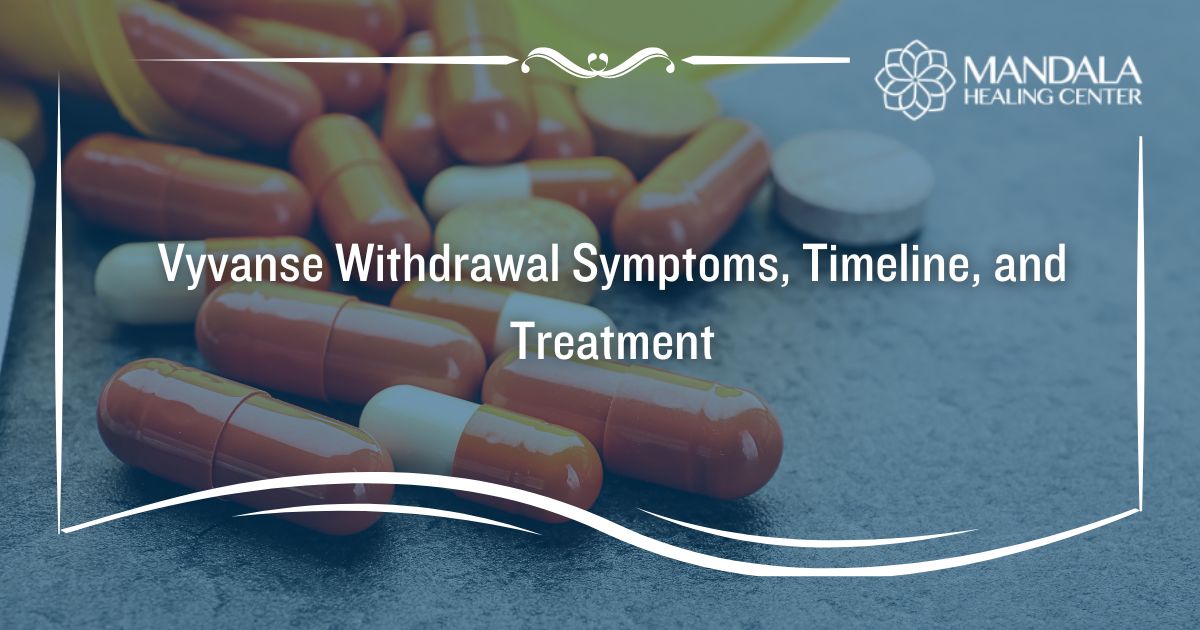Vyvanse is a prescription stimulant drug used to treat attention deficit hyperactivity disorder (ADHD) and binge eating disorder.[1] As a central nervous system stimulant, it increases the amount of dopamine and norepinephrine in your brain. This helps treat ADHD by decreasing impulsivity and improving focus or attention.
While Vyvanse helps manage ADHD and binge eating disorder, it can lead to adverse side effects. Some people experience mood swings, increased heart rate, and heightened blood pressure. Taking it in high doses can also lead to the development of an addiction.
Once you stop using Vyvanse, you will experience withdrawal symptoms. You might deal with depression and anxiety, cravings, trouble concentrating, and more.
Vyvanse withdrawal can begin as early as 24 hours after your last dose and continue for up to two weeks. As a result, you should always seek help from a medical detox program. The Mandala Healing Center can help you manage the symptoms of withdrawal through medical supervision, medications, and psychological support.
In this article, you will learn:
- What are the symptoms of Vyvanse withdrawal
- How long does withdrawal from Vyvanse last
- How will a medical detox center help you recover
What are the Symptoms of Vyvanse Withdrawal?
Vyvanse withdrawal occurs when you suddenly stop taking it after a period of dependence. You can experience withdrawal without suffering from Vyvanse addiction. However, most people who undergo withdrawal do meet the criteria for a substance use disorder.
The symptoms of Vyvanse withdrawal may include:[2]
- Mental health issues like anxiety and depression
- Strong cravings or desires to abuse Vyvanse
- Irritability and mood swings
- Decreased motivation to engage in daily activities
- Trouble concentrating or focusing
- Agitation and restlessness
- Suicidal ideation
- Auditory or visual hallucinations
If you are addicted to Vyvanse, you should seek treatment from an addiction treatment program that offers medical detox. They will provide you with medications that lessen your withdrawal symptoms and make it possible to achieve long-term recovery.
The Vyvanse Withdrawal Timeline
Vyvanse withdrawal can begin as early as 24 hours after your last dose and persist for two weeks. Without medical detox treatment, it can be incredibly difficult to overcome withdrawal without relapsing.
The timeline for Vyvanse withdrawal is as follows:
24 to 36 Hours
The first symptoms of withdrawal will begin within 24 to 36 hours of your last dose. People who consumed higher doses of Vyvanse might experience withdrawal symptoms earlier than others. People may experience something known as the “crash period” during this time. Symptoms may include fatigue, depression, cravings for Vyvanse, and increased appetite.
3 to 5 Days
Your withdrawal symptoms will reach peak intensity sometime between the third and fifth day. In other words, your symptoms will be at their most severe, and you must be receiving medical detox treatment during this time.
If you are going to experience the more severe symptoms of Vyvanse withdrawal like hallucinations or suicidal thoughts, they will arise during this period. Other symptoms may include trouble concentrating, confusion, agitation, fatigue, and more.
1 to 2 Weeks
Sometime between one to two weeks after your last dose, your symptoms will begin to subside. Most people overcome Vyvanse withdrawal after two weeks. That said, the withdrawal timeline can vary from person to person based on factors like length and frequency of use, overall health, and more.
How is Vyvanse Withdrawal Treated?
Medical detox centers treat Vyvanse withdrawal with an individualized approach. First, it is important to note that no single medication is indicated for the treatment of amphetamine withdrawal.[3] However, doctors might prescribe medications that target specific symptoms to help you feel better.
Medications that might be used during Vyvanse detox include:
- Antidepressants to manage depression and anxiety
- Antipsychotics to control agitation and hallucinations
- Anti-anxiety medications to manage severe anxiety like panic attacks
In addition to medication, you will receive medical supervision. Nurses will routinely check your vital signs to ensure that you are stable. This involves checking your heart rate, blood pressure, breathing rate, and body temperature. If anything comes back unusual, you will receive prompt treatment.
Vyvanse withdrawal is also challenging psychologically. It can lead to severe depression and anxiety. You might deal with intense cravings that are difficult to cope with.
Thankfully, medical detox programs offer 24/7 access to mental health professionals. You can have a quick chat during any type of day or night if you are struggling. You will also have access to individual therapy and group counseling.
Get Connected to a Vyvanse Detox Center
Vyvanse is a prescription stimulant that can lead to long-term addiction when abused. If you or a loved one misuses Vyvanse, it’s time to seek professional help. The first step in recovery is attending a medical detox center.
At the Mandala Healing Center, we offer a continuum of care. We will provide medical detox services and evidence-based addiction treatment, including therapy and relapse prevention planning.
Contact us today for more information on our Vyvanse detox services.
References:
- The Food and Drug Administration (FDA): Vyvanse Label
- The National Library of Medicine (NLM): Medical Aspects of Stimulant Use Disorders
- Merck Manual: Amphetamines












